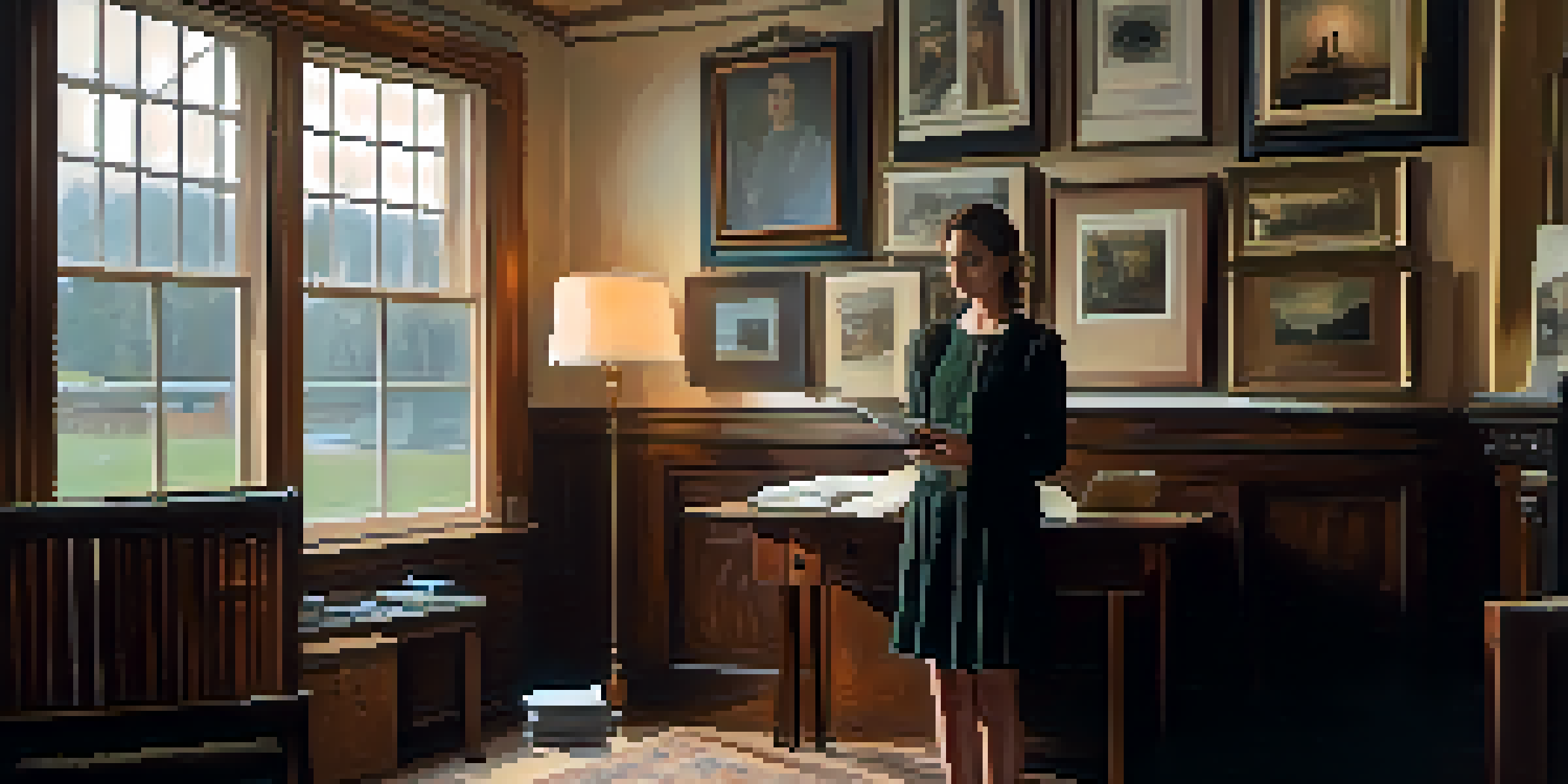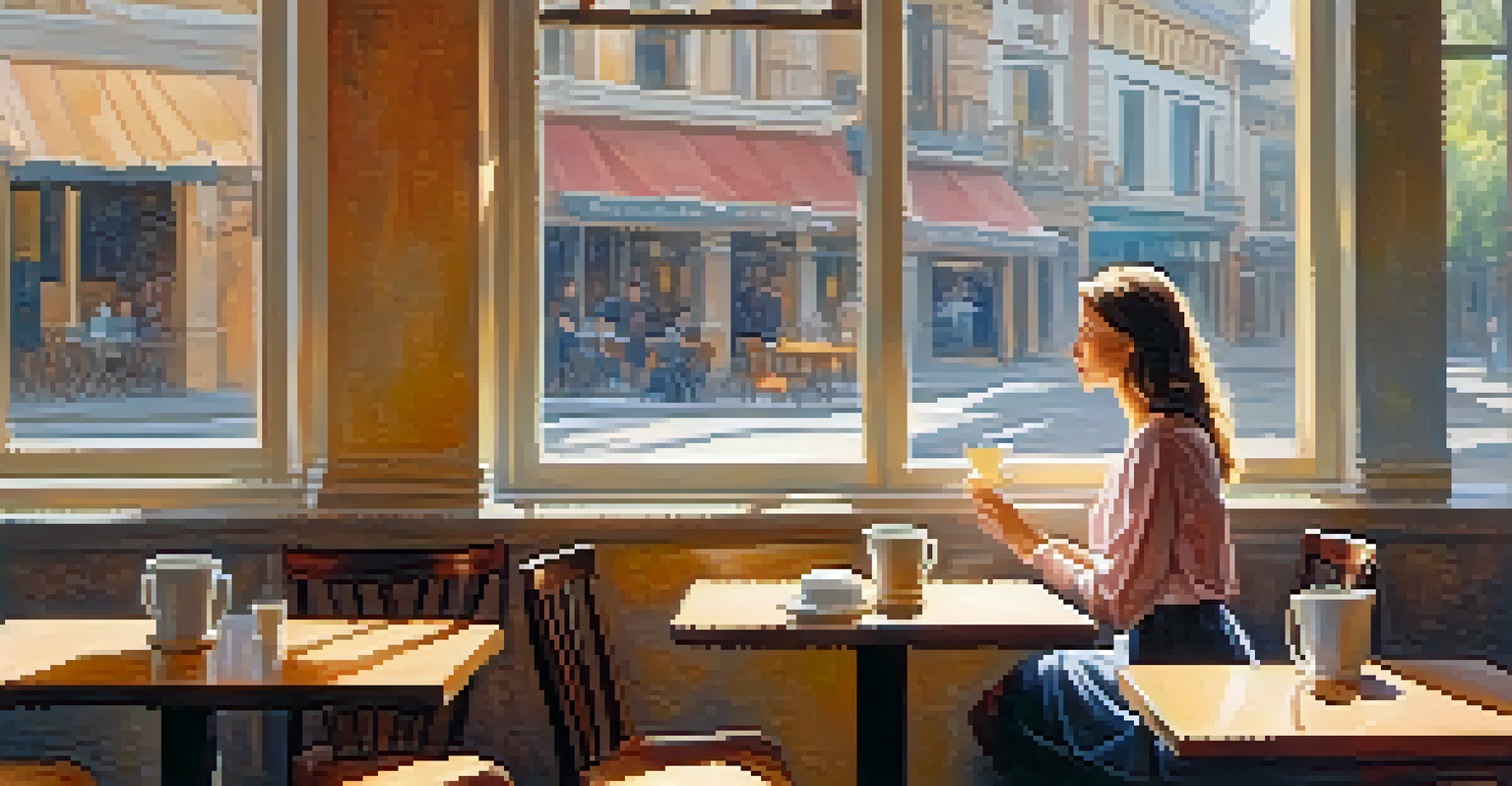Sofia Coppola: Feminine Perspectives in Modern Filmmaking

The Rise of Sofia Coppola in the Film Industry
Sofia Coppola emerged as a distinctive voice in modern cinema, captivating audiences with her unique storytelling. Born into a filmmaking family, she has carved her own path, demonstrating that the lens of a woman can provide a fresh narrative perspective. Her debut film, 'The Virgin Suicides,' showcased her talent for blending haunting imagery with emotional depth, setting the stage for her future works.
I think we all have a sense of isolation and loneliness, and it's how we deal with that that creates who we are.
What makes Coppola's films stand out is her ability to capture the nuances of female experiences. Unlike traditional narratives that often center on male protagonists, her stories delve into the intricacies of women's lives, exploring themes of isolation, longing, and self-discovery. This focus not only enriches the cinematic landscape but also invites viewers to empathize with perspectives that are often underrepresented.
Coppola's journey is not just a personal triumph but also a reflection of the shifting dynamics in Hollywood. As more women take on directorial roles, Coppola's influence serves as an inspiration, proving that feminine perspectives can resonate deeply with audiences and critically succeed in the industry.
Coppola's Signature Aesthetic and Style
One of the hallmarks of Coppola's work is her distinct visual style, characterized by dreamy cinematography and meticulous attention to detail. Her films often feel like an intimate glimpse into the characters' inner lives, inviting viewers to share in their emotional journeys. For instance, the ethereal quality of 'Lost in Translation' captures the disconnection and alienation experienced by its protagonists in a foreign land.

Coppola's use of color and composition is deliberate and powerful, often evoking a sense of nostalgia and longing. She expertly balances light and shadow, creating a visual language that complements her storytelling. This attention to aesthetics enhances the emotional weight of her narratives, making the viewer feel the characters’ joys and sorrows on a deeper level.
Coppola's Unique Female Perspective
Sofia Coppola's films explore female experiences, offering a fresh narrative that resonates with audiences and highlights underrepresented perspectives.
Furthermore, her soundtracks play a crucial role in establishing the mood of her films. With careful selection of music that often features indie and classic artists, Coppola crafts auditory experiences that resonate with the visuals, enhancing the overall emotional impact. This synergy between sound and image is a testament to her artistic vision and meticulous craftsmanship.
Themes of Isolation and Loneliness
Isolation is a recurring theme in Sofia Coppola's films, often portrayed through her female characters' struggles. In 'Lost in Translation,' for example, both main characters grapple with feelings of loneliness in a bustling city, highlighting how isolation can exist even in crowded spaces. This theme speaks to the universal human experience of feeling disconnected, making her stories relatable to a wide audience.
I want to tell stories about women and the way they experience the world.
Coppola's exploration of loneliness often intertwines with the concept of identity. Her characters frequently embark on journeys of self-discovery, searching for their place in the world while facing external pressures. This intimate portrayal of personal growth resonates strongly, particularly in a society that often emphasizes conformity over individuality.
Through her nuanced storytelling, Coppola invites viewers to reflect on their own experiences with isolation and the search for connection. By shedding light on these themes, she not only validates the feelings of her characters but also encourages audiences to confront their own emotions, fostering a deeper understanding of the human condition.
Feminine Perspectives in Character Development
Sofia Coppola’s films are renowned for their strong, complex female characters who defy stereotypes. Unlike many traditional narratives that depict women in one-dimensional roles, her characters are often multifaceted, grappling with their desires, fears, and aspirations. This depth allows audiences to connect with them on a personal level, seeing reflections of their own experiences and struggles.
For instance, in 'Marie Antoinette,' Coppola presents the titular character not merely as a historical figure but as a young woman navigating the challenges of privilege, isolation, and expectation. Through this lens, the film becomes a commentary on the pressures faced by women, highlighting their resilience and humanity. This approach fosters a richer understanding of historical and contemporary female experiences.
Visual and Auditory Aesthetic
Coppola's distinct visual style and carefully curated soundtracks create immersive experiences that enhance the emotional impact of her storytelling.
By centering her narratives around women's perspectives, Coppola challenges the status quo and expands the notion of what stories can be told in cinema. Her work encourages other filmmakers to explore diverse female experiences, paving the way for more inclusive storytelling in the industry.
Collaboration with Female Talent
Coppola is not only a trailblazer as a director but also a champion for female talent in the film industry. Throughout her career, she has collaborated with numerous women in key creative roles, from cinematographers to production designers, fostering an environment that encourages diverse voices. This collaborative spirit is evident in films like 'The Beguiled,' where the female ensemble cast brings depth and authenticity to the narrative.
By prioritizing female collaboration, Coppola highlights the importance of representation behind the scenes. This practice not only enriches her films but also sets a precedent for future filmmakers, demonstrating that diverse teams can lead to innovative and compelling storytelling. Her commitment to empowering women in the industry creates a ripple effect, inspiring others to follow suit.
Coppola's collaborations also extend to her use of female-centered narratives, where she often draws from her own experiences and those of her peers. This authenticity resonates with audiences and emphasizes the value of sharing women's stories, ultimately reshaping the cinematic landscape to reflect a more inclusive and diverse array of voices.
Coppola's Influence on Modern Cinema
Sofia Coppola's impact on modern cinema extends far beyond her individual films; she has reshaped the way stories are told in Hollywood. Her unique perspective has opened doors for a new generation of filmmakers, particularly women, to explore themes that resonate with diverse audiences. This shift in storytelling has led to a broader acceptance of narratives that focus on the female experience.
Coppola's ability to blend personal storytelling with universal themes has inspired many filmmakers to embrace their own voices and perspectives. Her films often prioritize emotional truth over conventional plot structures, encouraging others to break away from traditional storytelling norms. This approach not only enriches the film industry but also fosters a culture of authenticity and creativity.
Empowering Women in Film
Through collaboration with female talent and diverse narratives, Coppola sets a precedent for representation in the film industry, inspiring future filmmakers.
Moreover, her influence is visible in the increasing representation of women in key creative roles across the industry. As Coppola continues to challenge the male-dominated landscape of filmmaking, her legacy serves as a powerful reminder of the importance of diverse perspectives in shaping a more inclusive cinematic future.
Conclusion: The Legacy of Sofia Coppola
In conclusion, Sofia Coppola stands as a pivotal figure in modern filmmaking, blending her feminine perspective with innovative storytelling. Her films not only entertain but provoke thought and inspire empathy, inviting audiences to engage with complex emotional narratives. Through her unique lens, she captures the essence of the female experience, creating stories that resonate across generations.
Coppola's dedication to portraying women's lives authentically has transformed the cinematic landscape, encouraging more diverse narratives to flourish. As she continues to create, her influence on upcoming filmmakers is undeniable, paving the way for future storytellers to explore their own perspectives. This legacy of empowerment and authenticity is invaluable in an industry that continues to evolve.

Ultimately, Sofia Coppola's work reminds us of the power of storytelling and the importance of representation in film. By championing feminine perspectives, she not only enriches our understanding of women's experiences but also inspires us to embrace our own narratives, making her a true icon of modern cinema.